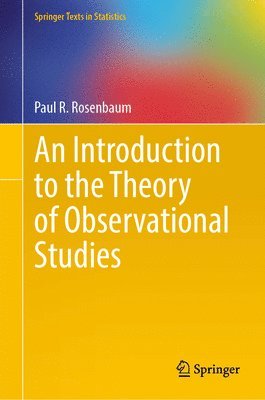Kommande

2099:-
This book is an introduction to the theory of causal inference in observational studies. An observational study draws inferences about the effects caused by treatments or preventable exposures when randomized experimentation is unethical or infeasible. An observational study is distinguished from an experiment by the problems that follow from the absence of randomized assignment of individuals to treatments. Observational studies are common in most fields that study the effects of treatments or policies on people, including public health and epidemiology, economics and public policy, medicine and clinical psychology, and criminology and empirical legal studies. After Part I reviews causal inference in randomized experiments, the twelve short chapters in Parts II, III and IV introduce modern topics: the propensity score, ignorable treatment assignment, the principal unobserved covariate, algorithms for optimal matching, randomized reassignment techniques for appraising the covariate balance achieved by matching, covariance adjustment, sensitivity analysis, design sensitivity, ways to design an observational study to be insensitive to larger unmeasured biases, the large sample efficiency of a sensitivity analysis, quasi-experimental devices that provide observable information about unmeasured biases, evidence factors and complementary analyses to address unmeasured biases. The book is accessible to anyone who has completed an undergraduate course in mathematical statistics. The subject is developed with the aid of two simple empirical examples concerning the health benefits or harms caused by consuming alcohol. The data for these examples and their reanalyses are freely available in an R package, iTOS, associated with Introduction to the Theory of Observational Studies.
- Format: Inbunden
- ISBN: 9783031904936
- Språk: Engelska
- Antal sidor: 407
- Utgivningsdatum: 2025-07-02
- Förlag: Springer International Publishing AG

